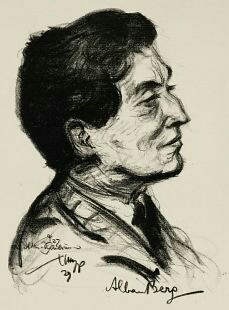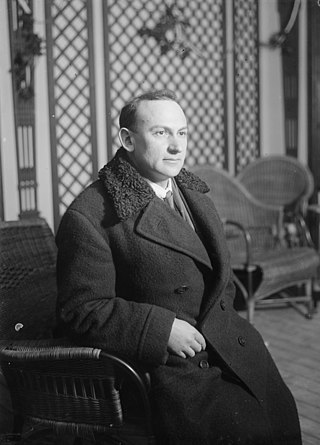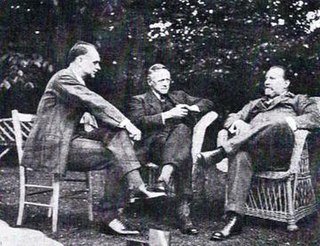Related Research Articles

Franz Schmidt, also Ferenc Schmidt was an Austro-Hungarian composer, cellist and pianist.

A string orchestra is an orchestra consisting solely of a string section made up of the bowed strings used in Western Classical music. The instruments of such an orchestra are most often the following: the violin, which is divided into first and second violin players, the viola, the cello, and usually, but not always, the double bass.
Dmitri Shostakovich's String Quartet No. 8 in C minor, Op. 110, was written in three days.
The Violin Concerto by Arnold Schoenberg dates from Schoenberg's time in the United States, where he had moved in 1933 to escape Nazi Germany. The piece was written in 1936, the same year as the String Quartet No. 4. At the time of its completion, Schoenberg was living in Brentwood, Los Angeles, and had just accepted a teaching position at the University of California, Los Angeles. The work is dedicated to Anton Webern.

Franz Adolf Berwald was a Swedish Romantic composer and violinist. He made his living as an orthopedist and later as the manager of a saw mill and glass factory, and became more appreciated as a composer after his death than he had been in his lifetime.

Robert Gerhard i Ottenwaelder was a Spanish Catalan composer and musical scholar and writer, generally known outside Catalonia as Roberto Gerhard.

The Lyric Suite is a six-movement work for string quartet written by Alban Berg between 1925 and 1926 using methods derived from Arnold Schoenberg's twelve-tone technique. Though publicly dedicated to Alexander von Zemlinsky, the work has been shown to possess a "secret dedication" and to outline a "secret programme".
D minor is a minor scale based on D, consisting of the pitches D, E, F, G, A, B♭, and C. Its key signature has one flat. Its relative major is F major and its parallel major is D major.

Berthold Goldschmidt was a German Jewish composer who spent most of his life in England. The suppression of his work by Nazi Germany, as well as the disdain with which many Modernist critics elsewhere dismissed his "anachronistic" lyricism, stranded the composer in the wilderness for many years before he was given a revival in his final decade.
Arnold Atkinson Cooke was a British composer.

Joseph Yulyevich Achron, also seen as Akhron was a Russian-born Jewish composer and violinist, who settled in the United States. His preoccupation with Jewish elements and his desire to develop a "Jewish" harmonic and contrapuntal idiom, underscored and informed much of his work. His friend, the composer Arnold Schoenberg, described Achron in his obituary as "one of the most underrated modern composers".
The Austrian composer Arnold Schoenberg published four string quartets, distributed over his lifetime: String Quartet No. 1 in D minor, Op. 7 (1905), String Quartet No. 2 in F♯ minor, Op. 10 (1908), String Quartet No. 3, Op. 30 (1927), and the String Quartet No. 4, Op. 37 (1936).

Dial Records was an American record company and label that specialized first in bebop jazz and then in contemporary classical music. It was founded in 1946 by Ross Russell. Notable artists who recorded for Dial include Charlie Parker, who signed an exclusive one-year recording contract with Russell on 26 February 1946, as well as Miles Davis, Max Roach, and Milt Jackson. Dial Records initially pressed its music for the Tempo Music Shop of Hollywood, California, but soon relocated to New York City.

Bethany Beardslee is an American soprano particularly noted for her collaborations with major 20th-century composers, such as Igor Stravinsky, Milton Babbitt, Pierre Boulez, George Perle, Sir Peter Maxwell Davies and her performances of great contemporary classical music by Arnold Schoenberg, Alban Berg, Anton Webern. Her legacy amongst midcentury composers was as a "composer's singer"—for her commitment to the highest art of new music. Milton Babbitt said of her "She manages to learn music no one else in the world can. She can work, work, work." In a 1961 interview for Newsweek, Beardslee flaunted her unflinching repertoire and disdain for commercialism: "I don't think in terms of the public... Music is for the musicians. If the public wants to come along and study it, fine. I don't go and try to tell a scientist his business because I don't know anything about it. Music is just the same way. Music is not entertainment."
Paul August von Klenau was a Danish-born composer who worked primarily in Germany and Austria.
Johannes Brahms' String Quartet No. 1 in C minor and String Quartet No. 2 in A minor were completed in Tutzing, Bavaria, during the summer of 1873, and published together that autumn as Op. 51. They are dedicated to his friend Theodor Billroth. He only published one other string quartet, No. 3 in B-flat Major, in 1876.

Thomas Edward Clark was an English conductor and music producer for the BBC. Through his positions in leading new music organizations and his wide-ranging contacts with British and European composers, he had a major impact on making contemporary classical music available to the British public for over 30 years. He was a leading figure in the BBC's Concerts of Contemporary Music between 1926 and 1939, and he played a significant role in the founding and early development of the BBC Symphony Orchestra. He held prominent positions in the International Society for Contemporary Music (ISCM) from its inception in 1922, and was its president from 1947 to 1952.

Hugo Gottesmann was an Austrian violinist, violist, conductor, and chamber musician. A highly decorated soldier in World War I, his career in Vienna as a conductor and violinist was truncated with the advent of the Third Reich in 1933. He was fired from his positions at Radio Wien, the Vienna Symphony, and the Academie für Musik and forced to seek work elsewhere in Europe and emigrate to the United States.
Richard Hoffmann was an American composer, musicologist and educator. He served many years as a professor at Oberlin Conservatory of Music.